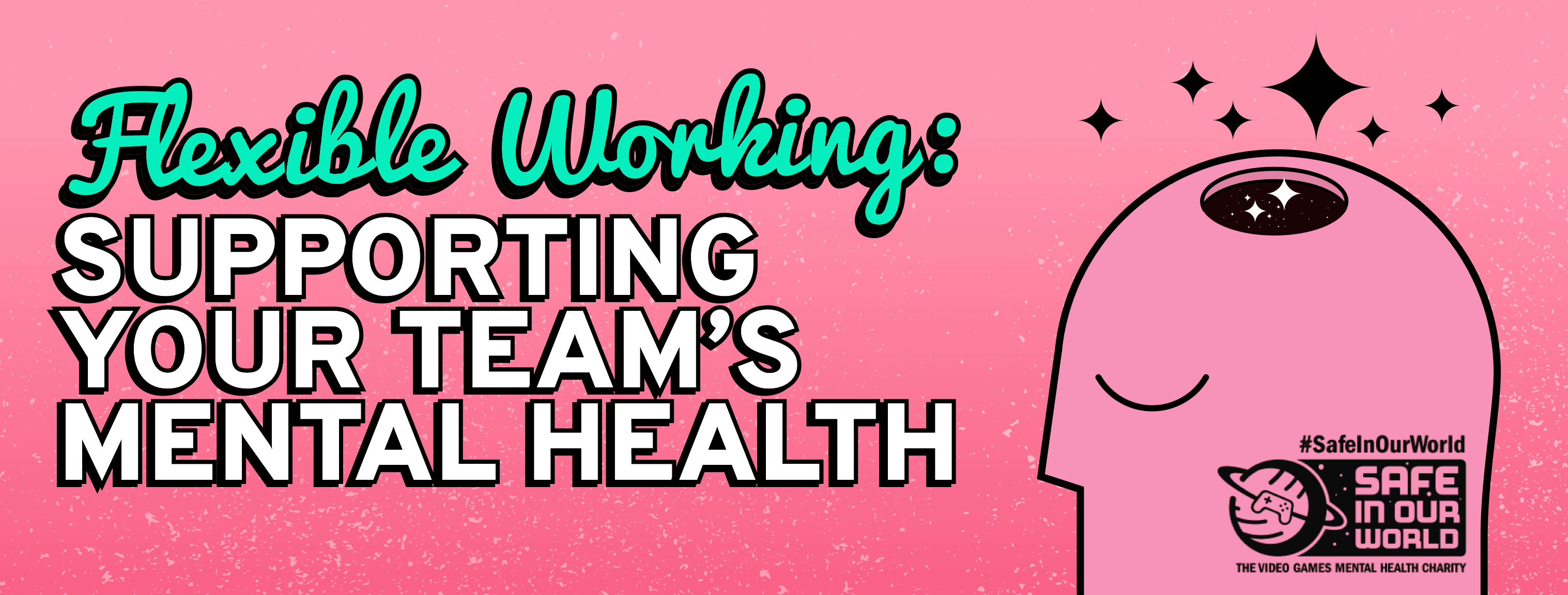Flexible Working: Supporting Your Team’s Mental Health
Sky Tunley-Stainton, Partnerships & Training Officer (Safe In Our World)
10th May 2023

Disclaimer: Please note that we are not giving mental health advice; it's important to talk to a trained professional in case of a mental health concern.
A 2021 study by UKIE found that 38% of games industry professionals live with anxiety, depression, or both. The symptoms of anxiety and depression will vary from person to person. Still, they can often cause tiredness, difficulty concentrating, aches and pains, feeling guilty or fearful, and create difficulty in social situations or crowds.
Mental illness can impact work performance in a number of ways, from lower productivity, less willingness to bring forth ideas, absenteeism or presenteeism, and an increase in the number of sick days taken. Individuals who have been diagnosed with mental health issues are unlikely to disclose this to employers immediately, if at all, according to Skillsearch’s 2023 jobs report. This makes it all the more important for employers to have open discussions and policies around accommodations to create psychologically safe spaces where employees can seek support without the fear of stigma.
The mission of Safe In Our World is to create and foster worldwide mental health awareness within the video games industry. We are keenly aware that there are innumerable contributing factors when people experience ill mental health. These include but are not limited to loneliness, poor financial well-being or debt, long-term stress, physical and neurological health, and familial factors. It is part of our mission to empower and encourage employers to support their teams by considering these factors and understanding how they can be alleviated through simple provisions for support during work. One of the key ways employers can support employees’ mental well-being is through a flexible approach to working arrangements.
How flexible working supports mental health
Flexible working solutions can help employees with a mental health diagnosis by allowing them to manage their work schedule around appointments, self-care, hobbies, caring responsibilities and other commitments. When considering flexible working arrangements, it’s important to note that everyone is different. A flexible working solution that works for one person may not apply to others – even those with the same mental health diagnosis.
Working from home can often be a simple solution to support individuals struggling with their mental health. Being able to work from home can eliminate commuting time, which may otherwise contribute to tiredness, and alleviate anxiety around commuting via public transport. It allows individuals to work in a safe and familiar environment; and can improve work-life balance, thereby strengthening vital interpersonal relationships and giving more time to keeping on top of household tasks (often daunting for those with poor mental health); and can help to reduce financial stress by saving money on travel expenses.
Others may prefer the flexibility of working in the office more than at home. Their chief financial pressure may be electricity and heating bills, and being able to work from the office can reduce these costs. Or, they may really need the social interaction that office work allows. And, crucially, office working can be much safer for individuals with strained circumstances at home.
While home and/or office work is usually the primary consideration when it comes to flexible working arrangements, it’s not the only factor that can support people with their mental health. Other considerations may include flexible working hours (which can be determined around ‘core hours’), reduced or compressed hours, or a 4-day work week. Each of these allows more time for “life admin” and provides valuable time to focus on mental health and well-being alongside increasing productivity and job satisfaction.
By implementing flexible working solutions, employers can help to instil self-belief in employees who are mentally unwell. Confidence can be particularly challenging for individuals with depression, anxiety, or other mental health conditions, so feeling trusted and valued can help enormously. Given that people’s situations may change over time, staff should also be made aware that they can request to modify their working arrangements at any point. Being vocal about available accommodations and support, and ensuring your team knows they will not be penalised for accessing this support, is paramount.
What can employers do to support mental health
As well as flexible working, employers can promote psychologically safe work environments through their approach towards conversations around mental health in the workplace.
- Eliminating stigma: the best way to shift the culture around mental health stigma is by talking about it. Employers should encourage open and honest discussion around mental health regularly, for example, in team meetings and one-to-ones, and ensure that information about mental health support is easily accessible to all levels of staff.
- Promoting mental health awareness: it can help to arrange specific activities around an event or theme to open up the conversation around mental health. ‘Mental Health Awareness Month’ in May or ‘World Mental Health Day’ on October 10th are good places to start opening up this conversation and promoting learning about different mental illnesses and contributing factors.
- Providing training for managers: those in leadership positions are the most likely to be dealing with disclosures of mental health and may be best positioned to influence attitudes within their teams. Ensuring managers have received training and information about mental health will increase their confidence and willingness to approach this topic with compassion, flexibility, and open-mindedness.
By prioritising the mental health and well-being of employees, employers can create a healthier and more productive team, enabling both the company and employees to thrive.